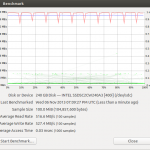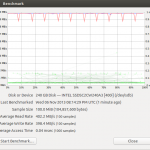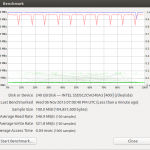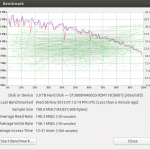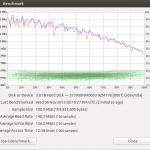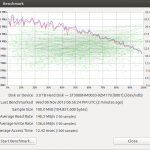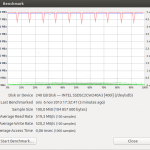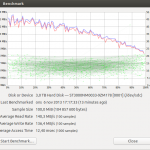During my VT-d verification on the ASRock Z86 Extreme6 I took the opportunity to compare the performance of three different storage controllers, namely:
- Intel Z87 (onboard)
- ASMedia ASM1062 (onboard)
- LSI 9211-8i (PCI-Express 8x add in card)
Below is a summary of the test setup and the results of the tests.
Test System
- ASRock Z87 Extreme6
- Intel Core i7 4771
- Kingston 32GB DDR3
- LSI 9211-8i (cross flashed IBM ServeRAID M1015)
- Intel SSD 520 Series (SSDSC2CW240A3), 240GB
- Seagate Constellation ES.3 (ST3000NM0033), 3TB
Native performance
Comparison of the three controllers are done with the simple hard disk benchmark tool in Ubuntu 13.10.
SSD Performance
| Average read [MB/s] | Average write [MB/s] | Average access time [ms] | |
| Intel Z87 | 516.6 | 527.4 | 0.03 |
| ASMedia ASM1062 | 402.2 | 398.4 | 0.04 |
| LSI 9211-8i | 546.9 | 521.8 | 0.04 |
HDD Performance
| Average read [MB/s] | Average write [MB/s] | Average access time [ms] | |
| Intel Z87 | 140.3 | 136.1 | 12.4 |
| ASMedia ASM1062 | 140.3 | 136.0 | 12.5 |
| LSI 9211-8i | 140.3 | 136.6 | 12.4 |
Passthrough Performance
Passthrough performance is measured with ESXi 5.5 installed on a USB memory and the LSI card passed through to a VM. The VM is running the same version as in the above benchmarks, ubuntu 13.10. The performance is only run with the LSI card. I really tried getting passthrough working with the ASMedia controller as this would open up to some interesting storage opportunities with this board. However, Ubuntu recognized the controller but did not find any disk attached to it. Also, now that I think about it, I have no idea why I did not think about trying to pass through the Z87 controller. Anyway, here is the comparison, SSD and HDD combined.
| Average read [MB/s] | Average write [MB/s] | Average access time [ms] | |
| SSD – Native | 546.9 | 521.8 | 0.04 |
| SSD – Passthrough | 519.3 | 520.2 | 0.06 |
| HDD – Native | 140.3 | 136.6 | 12.4 |
| HDD – Passthrough | 140.3 | 136.4 | 12.4 |
Final thoughts
The ASMedia controller is not capable of handling the performance of modern SSDs. For mechanical drives there is practically no difference between the three different controllers.
I had an idea of using the Intel controller for the ESXi datastore and pass through the ASMedia controller to a VM. Then it would be possible to setup software RAID for the drives connected to the ASMedia controller. This is a solution working very well for me today with the LSI card, but it would have been nice to have an all-in-one solution.
There are some performance impacts on reads when passing through the LSI card to a VM. I have not investigated this further but it might very well be benchmark technical reasons behind it.

